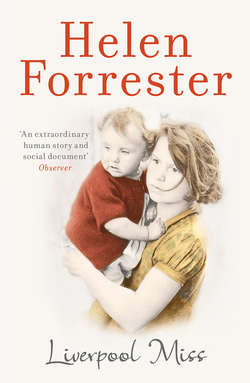Читать книгу Liverpool Miss - Helen Forrester - Страница 15
Ten
ОглавлениеSpring had come at last. The trees lining Princes Avenue were stickily in bud; the privet hedges behind the low, confining front walls of the houses were already bursting into leaf, and the sparrows and pigeons were a-bustle with the need to mate.
I wheeled Edward down Parliament Street to the small Carnegie library in Windsor Street. A playful wind flipped dust and pieces of paper round its railings, against which women leaned, shopping bags on arm, to gossip in the pale sunshine. The soot-covered library was a handsome little building with high, arched windows which made it pleasantly light inside. Its battered books passed through my hands at the rate of about half a dozen a week and helped me to forget hunger, cold and humiliation. The librarians knew me and sometimes recommended a new book which had come in. In those days, librarians seemed to be great readers and both Father and I enjoyed discussions with them about books we had read.
I parked the Chariot close to the iron railings at the front. Edward was a patient child who would sit and watch the passers-by while I hastened to find something new to read.
As usual, I went directly to the section devoted to travel books. A new travel book was a great treat to me, I learned all I know of geography from them. I would carefully follow on the maps in the books journeys through countries as diverse as Tibet and Bermuda, examining myopically photographs which ranged from very fuzzy to very clear. I was always annoyed when there was no map in the book because I did not have an atlas, and poor photography was also a great disappointment. Later, more affluent generations would travel by hitchhiking the routes my fingers traced so longingly on maps.
I pushed my straggling hair back behind my ears and took off my faulty glasses to peer closer at the shelves; sometimes I could see better without the glasses than I could with them.
‘Helen Forrester, isn’t it?’ inquired a voice from behind me.
I turned slowly, surprised that anyone should know me by name.
It was the deaconess from the church, to whom in a rage I had shown our house. It was no wonder that I had not recognised her voice. During our previous encounter, she had said so little while I had said so much. I blushed at the memory of my unpardonable outburst.
I murmured shyly that I was Helen. She looked very sweet in her coif and frumpy clothes.
‘I was about to come to see you,’ she announced unexpectedly. Then she glanced round the book-lined room. ‘Perhaps we could talk here, though. Let’s go over there.’ She took my elbow and guided me into a corner of the Fiction section.
‘I wanted to ask you, my dear, if you would like a job as a telephonist. A charity I know of needs a girl, and I immediately thought of you, because you have such a pleasant voice.’
I gaped at her, struck dumb by the unexpectedness of the offer. Then I gasped, ‘Oh, yes.’
She smiled at me, and continued, ‘The salary is not much – about twelve and sixpence a week. Would you like me to arrange an interview for you?’
Twelve shillings and sixpence a week seemed a huge sum to me. All the wonderful things it would buy danced before me, mixed with a terrible apprehension that I would not get the job because I was so dirty and had no clothes except the grubby, ragged collection I was wearing.
The deaconess was talking. ‘I thought I would ask you first, before speaking to your mother.’
At the mention of Mother, I remembered the sweet shop episode.
‘My parents will never agree to it,’ I said hopelessly. ‘I have to look after Edward.’
‘I’ve already thought of that,’ she responded eagerly. ‘Alice Davis lives a few doors away from you. She has an invalid mother who cannot be left alone and she badly needs to earn a few shillings. I am sure she would take care of Edward during the day – and she wouldn’t charge much.’
A fairy godmother in a blue coif! A true fairy godmother. A wave of gratitude surged through me, but I did not know how to express it. ‘Would she, really – would she do it?’ I whispered.
‘I’m sure she would, if I ask her.’
I was acquainted with Alice. She belonged to the Salvation Army. I said ‘good morning’ to her most Sundays, as she strode along the street pushing her mother’s wheelchair down to the Citadel. Her mother would be bundled up in rough grey blankets, regardless of whether it was winter or summer; and Alice wore a navy-blue uniform, with a matching Victorian bonnet trimmed with a red ribbon proclaiming ‘Salvation Army’ across the front. Her sturdy legs were clad in sensible black stockings and the shine on her black shoes equalled that on the shoes of our local police constable. Her cheerful face shone like her shoes. Occasionally, the Salvation Army band played at the end of our street, and Alice would rush down to them, clutching her cymbals, ready to join in while they were so close to her home. Alice was rough, but Edward would be safe with her.
Please, Lord, please let it happen, I prayed silently. Aloud, I said, ‘Thank you very, very much. I would love the job if you think I can do it.’
She smiled. ‘Of course you can do it. Shall I call on Mrs Forrester tonight? You might like to talk to both your father and your mother first.’
